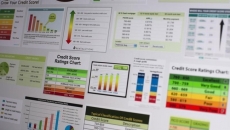As you take a closer look at your financial footing amid the headwinds of a pandemic, it’s an excellent time to examine the possible impact of a Joe Biden presidency on money matters.
It’s a new day in America.
— Joe Biden (@JoeBiden) January 20, 2021
The balance of Congress has shifted following the Georgia runoffs, providing possible momentum for President Biden’s agenda.
A new COVID check, taxes, health care — it’s all on the line. Here’s how.
A SHORT FUSE ON ANOTHER ROUND OF STIMULUS CHECKS
Look for another round of pandemic relief shortly after Biden’s inauguration, says Bernard Yaros Jr., an economist with Moody’s Analytics.
“In February, we expect that there’s going to be a COVID-specific relief package,” Yaros says. That measure will likely once again extend unemployment insurance benefits, with enough support for another round of checks issued to Americans, “whether it’s 2K or slightly lower,” he says.
Small businesses are likely to receive more grants and forgivable loans, as well.
“And we’re also thinking, you would probably get some additional funding for rental assistance,” Yaros adds.
MOVING FROM RELIEF TO STIMULUS
With Democrats gaining two seats in the Senate from the Georgia runoffs, there is now a greater possibility of moving from “relief” to “stimulus” mode in late 2021.
“That’s because now that the Democrats have a simple majority in the Senate. They can pass changes to the tax code as well as implement changes in spending,” Yaros says.
Moody’s Analytics economists expect the Biden administration will dedicate increased funding for enhancements to “social safety nets,” possibly including:
— Expanding eligibility for Medicare.
— Retooling Obamacare into Bidencare.
— Rolling out paid sick leave protections.
— Offering universal pre-K for 3- and 4-year-olds.
— Providing some kind of student debt forgiveness.
But on these initiatives, Democrats will “have to pick and choose,” Yaros says.
“Among the more moderate Democrats, they’re not going to want to increase the deficit too much. That’s obviously going to be a limiting factor,” he adds.
And while Vice-President Kamala Harris holds the deciding vote in the event of a Senate tie, the 50-50 split between Democrats and Republicans doesn’t constitute filibuster-proof power.
REVERSING TRUMP TAX CUTS
Higher taxes are expected to partially fund the widening of these social safety nets.
Yaros says Biden is likely to succeed in reversing Trump’s tax cuts, raising the corporate income tax rate to 28%, increasing the tax rate for taxable incomes of more than $400,000 and eliminating some tax breaks for those making more than $1 million.
But the tax hikes may be smaller than widely anticipated, says Michael Zezas, head of U.S. public policy research at Morgan Stanley.
“In a Senate where Democrats have the slimmest majority possible, any one Democratic senator effectively has a veto. And when it comes to taxes, we expect many of the Biden administration’s proposed taxes won’t pass muster with Democratic moderates,” Zezas says in an analysis.
“We estimate about $500 billion of tax increases are possible, obviously a smaller number than another potential COVID stimulus round, and also smaller than the $1 trillion-plus spending now in play for each of health care and infrastructure,” Zezas added.
Even if Biden can swing the tax hikes, they aren’t expected to kick in until 2024, Yaros says, “to make sure that there’s no fiscal drag, at all, on the economy in these next couple of years when we’re still digging ourselves out of the pandemic.”
REVISING RETIREMENT PLANS
Joe Biden also has some ideas to reshape employer-sponsored retirement plans.
One of those proposals is to equalize the tax benefit of contributing to a retirement plan so that “higher-income earners aren’t getting more of the benefit than the lower-income workers, that it’s standard across the board,” says Anne Tyler Hall, founder and principal of Hall Benefits Law.
For example, someone in a 37% tax bracket is able to deduct the full amount of a retirement plan contribution; so $37 for every $100 pre-tax contribution. That’s a greater tax benefit than someone in a lower tax bracket, such as 20%, who would receive a $20 deduction for each $100 pre-tax contribution.
The idea proposed by the Biden administration is to offer a tax credit to low- and moderate-income workers, resulting in an equal tax benefit.
Democrats are also pushing for employers to make retirement saving easier for the U.S. workforce.
“Employers who don’t offer retirement plans would be required to allow employees to make contributions to individual retirement accounts, IRAs,” Hall says. “Contributions to the IRAs would come directly from paychecks.”
With the shift of balance in Congress, Hall says such changes may be more likely. Plus, “some of these provisions have bipartisan support,” she adds






